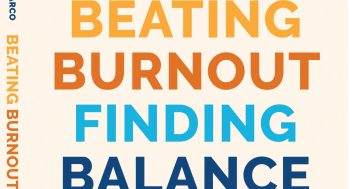Rachel Parnes* has five strategies to help managers who feel burnt out.
 It’s been a year since COVID-19 shutdowns began in the U.S. and while everyone has been forced to adapt and find ways to settle in, there’s one group that’s carrying an especially heavy burden—people managers.
It’s been a year since COVID-19 shutdowns began in the U.S. and while everyone has been forced to adapt and find ways to settle in, there’s one group that’s carrying an especially heavy burden—people managers.
Managers: we see you. You’re motivating and supporting your teams and driving the business forward, all while doing your own outstanding individual work, and striving for equity in the workplace.
And that’s just at work. Over the last year, you’ve also had to manage shifting family dynamics, health concerns, and whatever else this unusual year has thrown your way.
It’s a lot of pressure.
The folks at Glint had this in mind when they wrote the State of the Manager Report.
How are people managers coping? Spoiler alert: burnout rates are particularly high.
If you’re a manager experiencing burnout, the data is clear: you’re not alone.
Since 2019, managers experienced a 29 per cent increase in burnout.
The signs that you’re teetering on burnout will likely sound familiar.
For managers, ‘overwhelming workload’ was the top precursor to official burnout, followed by ‘feeling disconnected from colleagues’ and ‘conflict between home and work demands.’
When we read this, our first thought was, who isn’t experiencing these things?
So, we pulled together some free courses to help us all cope. How can we pause, prioritize our wellbeing, and reroute?
These seven courses can help you prevent further burnout and keep moving forward. Watch them for free through December 2021.
- How to Manage Feeling Overwhelmed with Heidi Hanna
- Developing Your Emotional Intelligence with Gemma Leigh Roberts
- Banish Your Inner Critic to Unleash Creativity with Denise Jacobs
- Building Resilience with Tatiana Kolovou
- Embracing Unexpected Change with Todd Dewett
- Critical Thinking for Better Judgment and Decision-Making with Becki Saltzman
- Why Trust Matters with Rachel Botsman
Here are some of our favorited strategies from the courses above.
Five strategies to help managers prevent or overcome burnout
#1 Take one small step
When you’re in burnout mode, it’s easy to feel stuck.
Everyone’s demanding your attention and you can’t seem to crawl out from your overwhelming to-do list or find time to take care of yourself.
In these moments, focus on taking one small step.
“Research shows that taking any sort of action, no matter how small, can give us a sense of accomplishment,” says Heidi Hanna in her course, How to Manage Feeling Overwhelmed.
“Even if it’s not directly related to the cause of our overwhelm, taking an action releases the pressure build-up to feel like the problem is more manageable, or to feel like we’re more able to cope.”
If you have a big project looming, break it down into manageable micro-steps.
Instead of adding “finish report” to your to-do list, try “research two market statistics” or “write down titles for the first three sections.”
Ah, that feels more manageable.
This applies to self-care too.
What will help you refuel on a personal level?
Maybe it’s taking a walk around the block, calling a friend, or simply sitting down with a family member for five uninterrupted minutes.
When you take action on one quick-win task related to a goal that matters to you, it gives you a boost of forward momentum that can pull you out of paralysis.
#2 Figure out what you love to do, so you can do more of it
Where do you find your flow—that feeling of being absorbed in an activity and so “in the zone” that time passes without you noticing?
If you’re lucky enough to find it at work with projects like writing, mentoring employees or leading team meetings, celebrate that!
And seek out ways to do more of this work you love.
But what if you just can’t find anything you love about your job right now? That’s when you look to your personal interests.
What is that thing that reminds you that the current moment isn’t so bad after all?
Identify what it is you enjoy doing and make time for it. But remember: one small step at a time.
When you get clear on what flow is for you as an individual and weave that into your life, it can help you face challenges with confidence, explains Gemma Leigh Roberts in Developing Your Emotional Intelligence.
“Working your flow should feel effortless and rewarding,” says Gemma. And in the throes of burnout, we can all use a big dose of “effortless and rewarding”!
#3 Don’t compare yourself to other people
It may seem like someone else has it better than you, especially through the lens of social media and our new digital work environment.
But we can never really know what other people are going through.
Comparing yourself to other people is never a good idea, but it can be particularly damaging if burnout has zapped your confidence and motivation.
“When we see others succeeding where we haven’t yet, we fall into the trap of feeling like a failure by comparison,” says Denise Jacobs in Banish Your Inner Critic to Unleash Creativity.
“We need to direct a laser-like focus towards acknowledging and basking in our own successes.”
Instead of making assumptions about other people’s situations and comparing yourself to them, use that energy to focus on yourself and what you’ve achieved.
Jacobs recommends taking inventory of your successes: What did you complete? What knowledge or skills did you develop? What obstacles did you overcome? What are you proud of?
Every accomplishment, big and small, counts, from getting out of bed in the morning and showing up to that Zoom call to helping a direct report nail their career goals. You’re probably doing more than you think.
As Jacobs says, “When we’re busy celebrating our own efforts, we won’t have the mental bandwidth or inclination to compare ourselves with others.”
#4 Know when to move on
Most of the time, challenging situations call for perseverance.
You use your coping skills to power through and grow. But as Tatiana Kolovou explains in Building Resilience, “There are, however, a few situations where even though your coping skills have improved… the best thing to do is to take some cathartic action.”
You may need to cut certain things out of your life in order to move forward. Kolovou offers a few examples of when that makes sense:
- When you’ve communicated your needs clearly and tried to make changes but a relationship is not improving—it may be time to let go of that friendship that’s taking up so much of your time and energy.
- When a professional relationship is no longer serving you and ending it won’t negatively affect your career—this may be the “end of the chapter” with a colleague or mentor.
- When the stress is too high for you to face and it’s not worth investing energy on additional coping skills—this may be your opportunity to look for a job that’s a better fit.
But don’t make rash decisions. These are big decisions that you need to put thought and time into, which brings us to number five.
#5 When a big decision comes knocking, wait 48 hours before taking action
The world is a wild place and yet, here comes a huge decision knocking at your door—work or personal.
When you’re on the verge of burnout, or deeply overwhelmed with responsibilities, it can be difficult to think clearly.
So, when a big decision comes up, expert Todd Dewett says the first thing to do is absolutely nothing.
That’s right: hit pause and create some space for yourself.
“What you need is a little perspective and sometimes it’s best to step back and not try to manage the issue immediately,” says Todd Dewitt in his course Embracing Unexpected Change.
His rule is to avoid big decisions for at least 48 hours.
This will give you time to rationally analyse the situation and talk through options with a friend or mentor, or family members who may be affected by the outcome.
*Rachel Parnes is Senior Brand and Content Marketing Manager at LinkedIn
This article first appeared at linkedin.com.











